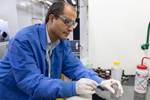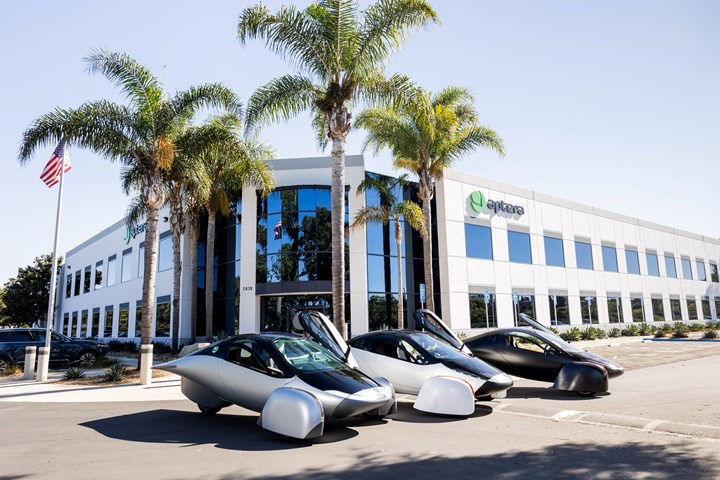Aptera secures $33 million to fund initial phases of solar EV production
Community-led Accelerator Program will contribute to the procurement of low-volume tooling and the buildout of product-intent BinC, adding to $100+ million received over the last couple of years.
As of Jan. 31, solar electric vehicle (sEV) manufacturer Aptera (Carlsbad, Calif., U.S.) successfully completed its Accelerator Program, raising more than $33 million to fund the initial phases of production for its composites-intensive sEV, BinC. The Accelerator Program was a community-led effort that enabled anyone to garner one of Aptera’s first 2,000 vehicle reservation slots by investing $10,000 or more into the company’s crowdfunding campaign.
The program, which was launched in January 2023, continued to raise significant funds throughout the year and gained momentum since the new year, raising more than $2 million in the last few days. Each Accelerator slot was ranked by investment amount, with the first spot garnering close to $4 million in total. In total, the company says it has secured over $100 million during the last 2 years.
“The Aptera community is full of pioneers, dreamers and those who challenge the status quo,” Chris McCammon, Aptera’s community and content manager, says. “When markets were down, other EV startups were struggling and the few other solar EV startups that existed disappeared. We knew that couldn’t be our story. With the help of our community, we’re building a solar-powered vehicle for the people, by the people.”
Aptera’s EV design will cover most daily driving needs completely off the grid through solar power. The company has a patented design for two-axis automotive-grade solar panels, an efficient powertrain and an energy-dense battery packs, all ensuring eco-friendly mobility.
Aptera’s debut product, the Launch Edition vehicle, has a 400-mile range on a single charge. The Launch Edition is equipped with approximately 700 watts of solar cells, enabling drivers to cover an additional 40 miles per day purely from solar energy.
With the $33 million raised through the Accelerator Program, Aptera has secured the capital to fund its initial phases of production, marking a pivotal moment for the company. Funds raised through this program have and will continue to contribute to the procurement of low-volume tooling and the buildout of the company’s first production-intent vehicles which will be used for testing and validation.
After Aptera’s production-intent vehicles have been validated, the last step is to raise capital for the sourcing of tooling and equipment for high-volume production, which is expected to require 10 times less capital than traditional automakers.
“When we first launched Aptera as a solar mobility company, we were amazed by the overwhelming support from thousands of prospective Aptera owners,” Chris Anthony notes. “With over 46,000 reservation holders, we are dedicated to securing the remaining funds required for scalable, high-volume production of our solar EV.”
Although Aptera’s Accelerator program is now closed to new participants, the company is still offering anyone the opportunity to become a shareholder and join its solar mobility movement at invest.aptera.us. “By democratizing ownership and inviting individuals from all walks of life to become shareholders, we are fostering a sense of collective ownership and responsibility towards not only this vehicle, but the future of our planet,” Quincy Hilla, senior manager of marketing communications, adds.
Related Content
-
Thermoplastic composites: Cracking the horizontal body panel nut
Versatile sandwich panel technology solves decades-long exterior automotive challenge.
-
Carbon fiber, bionic design achieve peak performance in race-ready production vehicle
Porsche worked with Action Composites to design and manufacture an innovative carbon fiber safety cage option to lightweight one of its series race vehicles, built in a one-shot compression molding process.
-
Composites end markets: Automotive (2024)
Recent trends in automotive composites include new materials and developments for battery electric vehicles, hydrogen fuel cell technologies, and recycled and bio-based materials.
















